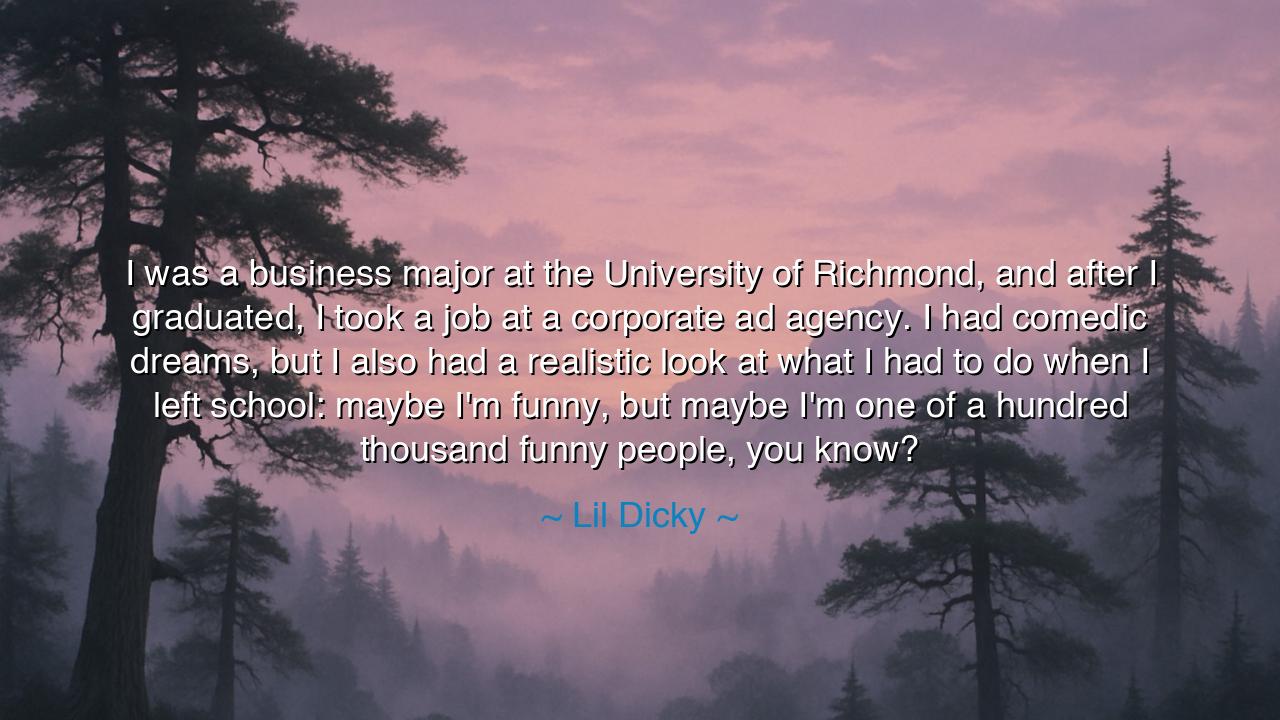
I was a business major at the University of Richmond, and after I
I was a business major at the University of Richmond, and after I graduated, I took a job at a corporate ad agency. I had comedic dreams, but I also had a realistic look at what I had to do when I left school: maybe I'm funny, but maybe I'm one of a hundred thousand funny people, you know?






When Lil Dicky spoke the words, “I was a business major at the University of Richmond, and after I graduated, I took a job at a corporate ad agency. I had comedic dreams, but I also had a realistic look at what I had to do when I left school: maybe I'm funny, but maybe I'm one of a hundred thousand funny people, you know?” he gave voice to the timeless struggle between dream and duty, between the fire of ambition and the weight of reality. His confession is not merely about comedy or career—it is about the human condition itself. It speaks to every heart that has ever carried a vision too grand for the narrow lanes of the world, every soul that has stood at the crossroads between passion and practicality.
Lil Dicky’s story is the story of countless dreamers who awaken each morning with the burden of responsibility pressing upon their shoulders and the whisper of imagination calling from afar. He studied business, not because it was the song of his spirit, but because it was the language of survival. He stepped into the corridors of the corporate world, yet within him burned the quiet knowledge that he was meant for something more—for the laughter, the art, the unpredictable beauty of creation. And so, his words capture a sacred tension: the recognition that to chase one’s dream is noble, but to understand the cost is wise.
This humility—this self-awareness—is not weakness but wisdom. For in saying, “maybe I’m one of a hundred thousand funny people,” Lil Dicky acknowledges the vast sea of talent that fills the world. He reminds us that dreams alone are not enough; they must be tempered by discipline, patience, and self-honesty. The ancients, too, knew this truth. The philosopher Epictetus taught that freedom is not doing whatever we wish, but mastering ourselves so that we might do what is truly worth doing. In recognizing the odds, Lil Dicky did not surrender—he prepared. He gathered strength in practicality, built skill in business, and later used both to shape his own destiny as an artist who turned limitation into liberation.
History offers us another mirror of this journey: the tale of Leonardo da Vinci, who, before he became the great painter and inventor, was an apprentice learning mundane craft and proportion. Though his dreams soared toward the divine, he labored first in the dust of the workshop, humbling himself before the discipline of skill. His genius was not born in a moment of inspiration—it was forged through realism, through the acknowledgment that greatness begins with grounded work. So too did Lil Dicky understand that the dreamer must first become the worker before he can become the master.
And yet, there is a quiet power hidden in his tone. Beneath the realism lies faith—the faith that, even among a hundred thousand, one can still rise. His words are not those of defeat but of preparation. He looked at the path before him, saw how narrow it was, and chose not to retreat but to walk it with open eyes. This is the wisdom of those who triumph without arrogance: to see the storm and still set sail. For dreams built upon awareness are not fragile—they are unstoppable.
From this reflection, we draw a lesson both ancient and eternal: dream boldly, but build wisely. Let your heart imagine wonders, but let your hands labor in truth. Do not despise humble beginnings or necessary compromises, for they are the soil from which greatness grows. The world does not reward wishful thinking—it rewards persistence, patience, and purpose. When you face doubt, as Lil Dicky did, remember that humility is not the enemy of ambition—it is its guardian.
So, take these words as your compass: acknowledge the crowd, yet never doubt your own light. When you stand among “a hundred thousand” others who share your dream, know that few will have your endurance, your discipline, your refusal to quit. Realism and idealism are not enemies—they are the twin wings that allow you to fly. Lil Dicky’s story teaches us that the dreamer who dares to work like a realist becomes unstoppable, and the realist who never stops dreaming becomes eternal.
Thus, the teaching endures: The path to your destiny is neither swift nor certain—but it is yours. Walk it with eyes open, heart steadfast, and faith alive. For even if you are “one of a hundred thousand,” remember this truth: no one else can live your story, and no one else can write your song.






AAdministratorAdministrator
Welcome, honored guests. Please leave a comment, we will respond soon